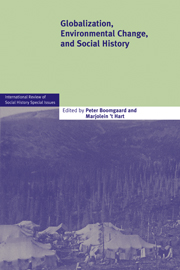Book contents
- Frontmatter
- Contents
- Notes on Contributors
- Globalization, Environmental Change, and Social History: An Introduction
- The El Dorado of Forestry: The Eucalyptus in India, South Africa, and Thailand, 1850–2000
- The Mid-Atlantic Islands: A Theatre of Early Modern Ecocide?
- Environmental Change and Globalization in Seventeenth-Century France: Dutch Traders and the Draining of French Wetlands (Arles, Petit Poitou)
- The Colonial Famine Plot: Slavery, Free Trade, and Empire in the French Atlantic, 1763–1791
- Environmental Changes, the Emergence of a Fuel Market, and the Working Conditions of Salt Makers in Bengal, c. 1780–1845
- Industrial Life in a Limiting Landscape: An Environmental Interpretation of Stalinist Social Conditions in the Far North
- “Pumpkins Just Got in There”: Gender and Generational Conflict and “Improved” Agriculture in Colonial Zimbabwe
- Hydro-businesses: National and Global Demands on the São Francisco River Basin Environment of Brazil
- Bibliography
Globalization, Environmental Change, and Social History: An Introduction
Published online by Cambridge University Press: 05 June 2012
- Frontmatter
- Contents
- Notes on Contributors
- Globalization, Environmental Change, and Social History: An Introduction
- The El Dorado of Forestry: The Eucalyptus in India, South Africa, and Thailand, 1850–2000
- The Mid-Atlantic Islands: A Theatre of Early Modern Ecocide?
- Environmental Change and Globalization in Seventeenth-Century France: Dutch Traders and the Draining of French Wetlands (Arles, Petit Poitou)
- The Colonial Famine Plot: Slavery, Free Trade, and Empire in the French Atlantic, 1763–1791
- Environmental Changes, the Emergence of a Fuel Market, and the Working Conditions of Salt Makers in Bengal, c. 1780–1845
- Industrial Life in a Limiting Landscape: An Environmental Interpretation of Stalinist Social Conditions in the Far North
- “Pumpkins Just Got in There”: Gender and Generational Conflict and “Improved” Agriculture in Colonial Zimbabwe
- Hydro-businesses: National and Global Demands on the São Francisco River Basin Environment of Brazil
- Bibliography
Summary
Throughout the ages, the activities of humankind have weighed considerably upon the environment. In turn, changes in that environment have favoured the rise of certain social groups and limited the actions of others. Nevertheless, environmental history has remained a “blind spot” for many social and economic historians. This is to be regretted, as changes in ecosystems have always had quite different consequences for different social groups. Indeed, the various and unequal effects of environmental change often explain the strengths and weaknesses of certain social groups, irrespective of their being defined along lines of class, gender, or ethnicity.
This Special Issue of the International Review of Social History aims to bring together the expertise of social and environmental historians. In the last few decades of the twentieth century, expanding holes in the ozone layer, global warming, and the accelerated pace of the destruction of the tropical forests have resulted in a worldwide recognition of two closely related processes: globalization and environmental change. The contributions to this volume provide striking case studies of such connections in earlier periods, revealing a fruitful interconnection between social and environmental history. This introduction provides a historiographical context for the essays that follow, focusing on the relevant notions connected with globalization and environmental change, and stressing the existing interactions between environmental and social history. We are particularly interested in the consequences of processes induced by globalization, how transnational forces and agents changed the socio-ecological space, and how that affected relationships between different classes in history.
- Type
- Chapter
- Information
- Publisher: Cambridge University PressPrint publication year: 2011
- 1
- Cited by

